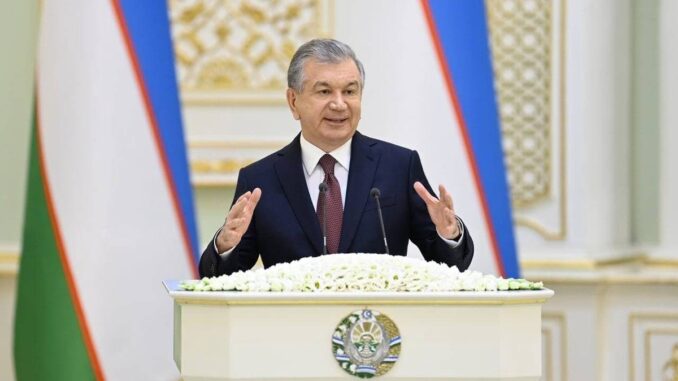
Shavkat Mirziyoyev has been the President of Uzbekistan since 2016. During his time in office, he implemented several reforms to modernize the country’s economy and society.
Some of his key achievements include:
- Economic reforms: Mirziyoyev has lifted many trade barriers, allowed the currency to float, and courted foreign investment. These reforms have helped to boost economic growth, which has averaged around 5% per year since he took office.
- Improved relations with neighboring countries: Mirziyoyev has taken steps to improve relations with Uzbekistan’s neighbors, particularly Tajikistan and Kyrgyzstan. He has also hosted several summits of the Shanghai Cooperation Organization, a regional security bloc.
- Freedom of speech and human rights: Mirziyoyev has released political prisoners and allowed greater freedom of speech and assembly. He has also signed many international human rights agreements.
- Investment in infrastructure: Mirziyoyev has invested heavily in infrastructure, including roads, railways, and airports. This has helped to improve connectivity and make it easier for businesses to operate in Uzbekistan.
- Tourism: Mirziyoyev has also made efforts to promote tourism, a major foreign currency source for Uzbekistan. He has opened up new tourist destinations and simplified visa requirements.
These are just some of the achievements of Shavkat Mirziyoyev since he became President of Uzbekistan in 2016. His reforms have been praised by many.
Shavkat Mirziyoyev elected President of Uzbekistan until 2030
According to preliminary results released by the Central Election Commission, Shavkat Mirziyoyev has been re-elected for a seven-year term as President of Uzbekistan. Mirziyoyev won the election with 87.1% of the vote, defeating his only challenger, independent candidate Narzulla Khakimova, who received 12.9% of the vote.
Shavkat Mirziyoyev, the President of Uzbekistan, has implemented several reforms in the country, including:
- Liberalizing the economy: This has included reducing taxes, deregulating businesses, and opening up the country to foreign investment.
- Eliminating forced labor: This was a major problem in Uzbekistan’s cotton industry, and Mirziyoyev has taken steps to ensure it no longer occurs.
- Redefining foreign policy: Mirziyoyev has sought to improve relations with Uzbekistan’s neighbors and the West. *Launching the New Uzbekistan 2022-2026 strategy aims to create a more open and prosperous Uzbekistan.
There is no doubt that Mirziyoyev has been a transformative leader for Uzbekistan.
Reforms that Mirziyoyev has implemented:
- In 2017, he signed a decree that abolished the practice of forced labor in the cotton harvest. This was a major step forward, as forced labor had been a major problem in Uzbekistan for many years.
- In 2018, he introduced a new law on foreign investment that made it easier for foreign companies to do business in Uzbekistan, increasing foreign investment in the country.
- In 2019, he launched a program to improve the country’s infrastructure, including roads, railways, and airports. This has made it easier for businesses to operate in Uzbekistan and has also made the country more attractive to tourists.
- Mirziyoyev has made significant progress in a short period, and he is committed to continuing the reforms.
Early life and career
Mirziyoyev was born in 1957 in the Jizzakh region of Uzbekistan. He graduated from the Tashkent Institute of Irrigation and Melioration in 1981 and later obtained a doctorate in engineering. He worked as an engineer, teacher, and researcher in the field of irrigation. He joined the Communist Party of Uzbekistan in 1983 and became a member of its successor, the People’s Democratic Party of Uzbekistan, after the collapse of the Soviet Union.
Mirziyoyev held various positions in the regional and national governments, such as governor of Jizzakh and Samarkand regions, minister of water resources, and prime minister. He was appointed as prime minister by Karimov in 2003 and served as his loyal ally for 13 years. He also became the chairman of the Liberal Democratic Party of Uzbekistan, the ruling party that dominates the parliament.
Presidency
Mirziyoyev became the acting president of Uzbekistan on September 8, 2016, after Karimov’s death was announced. He won the presidential election on December 4, 2016, with 88.6% of the vote, according to official results. He was sworn in on December 14, 2016.
Mirziyoyev has been seen as a reformist leader who has initiated some changes in the political, economic, and social spheres of Uzbekistan. He has released some political prisoners, eased media censorship, improved relations with neighboring countries, promoted foreign investment, and increased public participation in decision-making. He has also launched a series of ambitious projects to modernize the infrastructure, education, health care, and agriculture sectors.
However, Mirziyoyev has also faced some challenges and criticisms. He has not fully dismantled the authoritarian system that he inherited from Karimov and has maintained tight control over the security forces, judiciary, and civil society. He has not allowed any genuine opposition or independent media to emerge and has cracked down on dissenting voices. He has also been accused of human rights violations, corruption, nepotism, and mismanagement of public funds.
International relations
Mirziyoyev has pursued a more active and pragmatic foreign policy than his predecessor. He has sought to improve ties with neighboring countries such as Kazakhstan, Kyrgyzstan, Tajikistan, Turkmenistan, and Afghanistan. He has also expanded cooperation with regional and global powers such as Russia, China, the United States, the European Union, India, Turkey, Iran, and Saudi Arabia. He has participated in various multilateral forums such as the Shanghai Cooperation Organization (SCO), the Commonwealth of Independent States (CIS), the Organization of Islamic Cooperation (OIC), and the United Nations (UN).
Mirziyoyev’s main goals are to enhance Uzbekistan’s security, stability, and sovereignty; diversify its trade and energy partners, attract foreign investment and technology, promote regional integration and connectivity, and increase its international prestige and influence.
Conclusion
Shavkat Mirziyoyev is a leader who has brought some changes to Uzbekistan since he took office in 2016. He has implemented some reforms in various domains, but has also maintained a strong grip on power. He has pursued a more proactive and balanced foreign policy than his predecessor. He faces many opportunities and challenges as he tries to steer Uzbekistan towards a more prosperous and democratic future.



